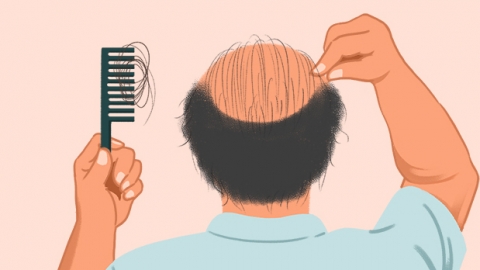What are the reasons for severe hair loss?
Generally speaking, severe hair loss refers to significant alopecia. Severe hair loss may be caused by mental stress, malnutrition, seborrheic dermatitis, alopecia areata, hypothyroidism, and other factors. It is recommended to seek timely medical attention and undergo treatment under the guidance of a physician. A detailed explanation is as follows:

1. Mental Stress
Long-term excessive mental stress, anxiety, tension, and other emotional states can cause endocrine disorders in the body, increase the secretion of hormones such as cortisol, interfere with the normal hair growth cycle, cause hair to prematurely enter the telogen phase, and fall out. It is recommended to relieve stress through activities such as exercise and meditation in daily life.
2. Malnutrition
Hair is primarily composed of protein. Long-term dietary imbalance, picky eating habits, or digestive system diseases that cause poor nutrient absorption can deprive hair of essential nutrients, causing it to become dry, brittle, and prone to severe hair loss. It is recommended to improve dietary structure and increase intake of foods rich in protein, vitamins, and minerals, which can help alleviate hair loss.
3. Seborrheic Dermatitis
Seborrheic dermatitis is mostly caused by overactive sebaceous glands and excessive proliferation of Malassezia fungi. Malassezia breaks down sebum to produce free fatty acids, which irritate the scalp and trigger inflammation. The inflammation affects the normal function of hair follicles, disrupts the hair growth environment, and leads to severe hair loss. It may also be accompanied by symptoms such as oily scalp, itching, and red patches. Treatment may include the use of medications such as ketoconazole shampoo, halcinonide solution, and pimecrolimus cream under a physician's guidance.
4. Alopecia Areata
Alopecia areata may be related to autoimmune factors, genetic predisposition, psychological factors, etc. The immune system mistakenly attacks hair follicles, causing damage to the follicles, preventing normal hair growth and resulting in hair loss. It often presents as sudden, round or oval patches of hair loss with clear boundaries and smooth skin in the affected area. It may also be accompanied by nail changes, such as longitudinal ridges on the nails. Treatment should follow medical advice and may include medications such as minoxidil solution, compound betamethasone injection, and cysteine tablets.
5. Hypothyroidism
Hypothyroidism may result from decreased thyroid hormone secretion and reduced metabolic activity in the body. A deficiency in thyroid hormones can cause metabolic disturbances in hair follicles, shorten the hair growth cycle, and cause hair to prematurely enter the telogen phase, leading to significant hair loss. It may also be accompanied by symptoms such as cold intolerance, fatigue, and excessive sleepiness. Treatment may involve the use of medications such as levothyroxine sodium tablets, methylprednisolone tablets, and prednisone acetate tablets as advised by a physician.
In daily life, frequent perming and dyeing of hair should be avoided to reduce damage from chemical substances to hair and hair follicles. At the same time, maintain a regular sleep schedule and ensure 7-8 hours of high-quality sleep each night.







